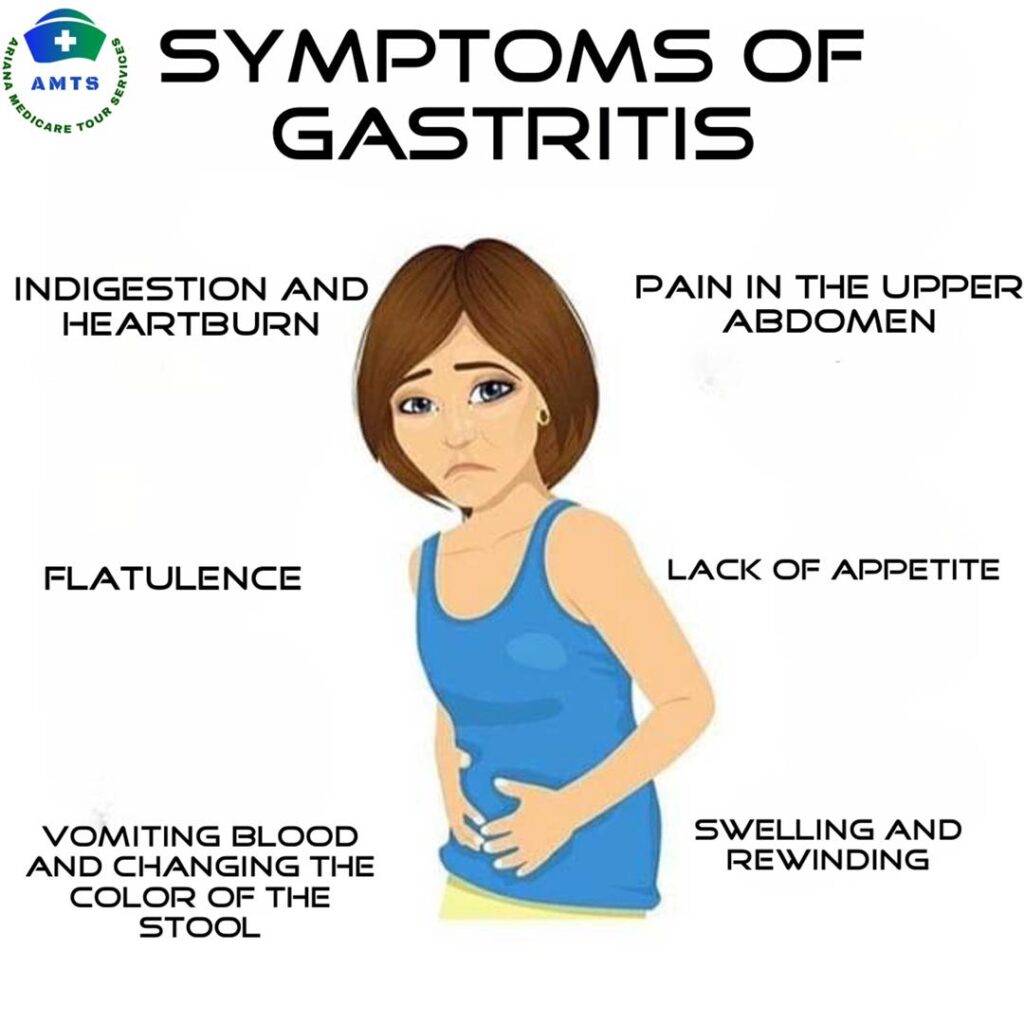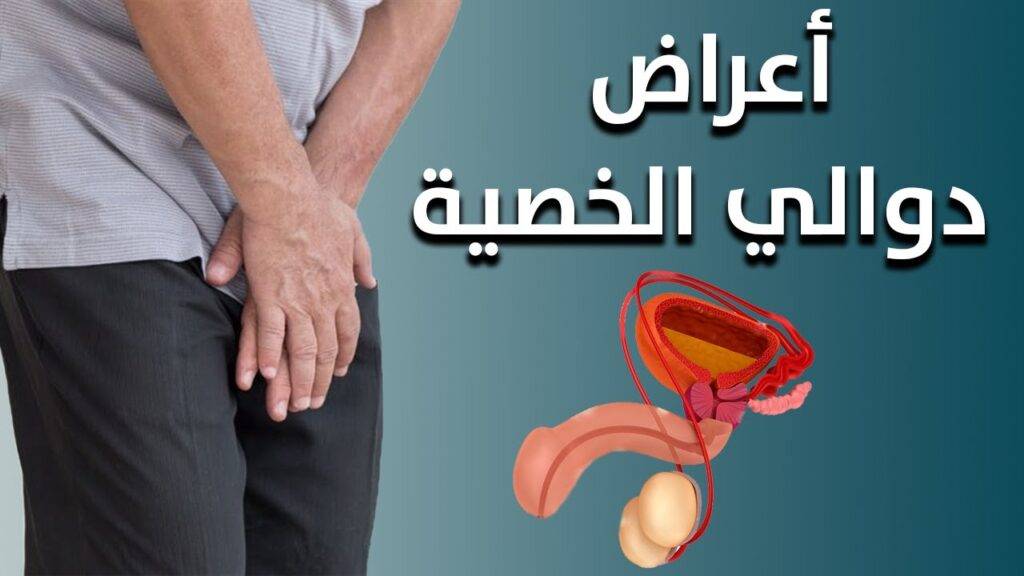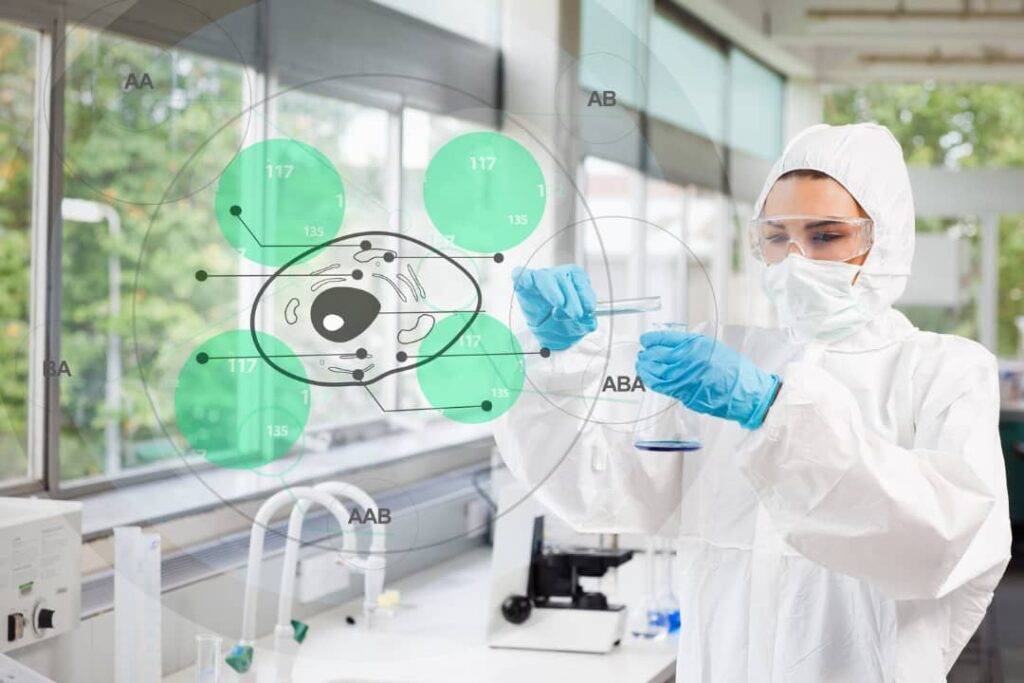Gastritis is a common disease affecting the digestive system. Gastritis occurs when the lining of the stomach becomes damaged as a result of factors such as bacterial infection, use of anti-inflammatory drugs, stress, or improper food intake. Gastritis can cause unpleasant symptoms such as abdominal pain, heartburn, bloating, nausea, and loss of appetite.

Table of Contents
- What is gastritis?
- Symptoms of gastritis.
- Symptoms of irritable gastritis.
- What is the cause of gastritis?
- Risk factors for gastritis.
- Gastritis and shortness of breath.
- Does gastritis cause shortness of breath?
- How is gastritis diagnosed?
- Gastritis treatment.
- Gastrointestinal tablets for gastritis.
- Diet for gastritis.
- Gastritis and anorexia.
- last word
What is gastritis?
The stomach contains an inner protective lining called mucus. This lining protects the stomach from its strong acid, which leads to the digestion of food. When something damages or weakens this protective shell, the mucous membrane becomes inflamed and gastritis occurs. Gastritis occurs for many reasons, but it is known that a type of bacteria called (Helicobacter pylori) is the most common bacterial cause of gastritis.

What is the cause of gastritis?
The cause of gastritis may have several causes, in the following we will examine the cause of gastritis. Gastritis can be caused by your diet and lifestyle habits. Some of these habits are:
- Drink a lot of alcohol.
- Eat spicy food.
- Smoking.
- Stress and severe anxiety.
- Long-term use of aspirin and over-the-counter pain and fever relievers (eg, nonsteroidal anti-inflammatory drugs or NSAIDs)
Symptoms of irritable gastritis
There is a variant of this disease called infectious neuritis, which has almost nothing to do with diseases of the gastrointestinal tract. When a person is under severe stress and anxiety for a long time, severe discomfort and various mental problems, these conditions affect the nerves of the stomach and cause stomach pain and gastritis. Among the important symptoms of infectious neuronitis, the following can be mentioned:
- Severe and sudden stomach pain.
- Painful and sudden stomach cramps.
- Vomiting and nausea.
- Puffiness
Symptoms of gastritis
Gastritis symptoms vary from person to person. Also, many infected people experience almost no symptoms. However, the most common symptoms of gastritis are:
- Frequent nausea or upset stomach.
- Puffiness.
- Stomachache Pain.
- Vomiting.
- Indigestion.
- Feeling of fullness or heartburn.
- Hiccups and belching;
- Loss of appetite and indigestion.
- He vomits blood.
- Presence of blood in the stool.
- Black and tarry stools

Note that the symptoms of gastritis can be similar to those of other diseases and health problems; Therefore, take any changes and symptoms in your body seriously and take timely treatment.
Regenerative and aggravating factors for gastritis
There are some factors that can increase people’s risk of developing gastritis. These factors are:
- Bacterial infection such as Helicobacter pylori infection.
- Continued use of pain relievers, especially pain relievers known as nonsteroidal anti-inflammatory drugs (NSAIDS), such as ibuprofen (Advil, Motrin IB, others) and naproxen sodium (Aleve, Anaprox DS).
- Age:
Older adults are more susceptible to gastritis because the stomach lining thins with age. Also, the elderly are more likely to develop Helicobacter pylori infection or autoimmune disorders than younger people. - Excessive consumption of alcohol:
Alcohol can irritate and erode the lining of the stomach. This makes the stomach lining more vulnerable to digestive juices. - Mental stress and extreme stress.
- Cancer treatment:
Chemotherapy or radiation therapy can increase your risk of developing gastritis. - Weakened immune system or autoimmune disorders:
This type of gastritis is called autoimmune gastritis and occurs when the body attacks the cells that make up the lining of the stomach. Autoimmune gastritis is more common in people with other autoimmune disorders, including Hashimoto’s disease and type 1 diabetes. Autoimmune gastritis can also be associated with a vitamin B12 deficiency - Other diseases:
Gastritis may also be associated with other medical conditions, including HIV/AIDS, Crohn’s disease, celiac disease, sarcoidosis, and parasitic infections.
Gastritis and shortness of breath. Does gastritis cause shortness of breath?
A common problem with gastritis is shortness of breath. In this disease, some people experience shortness of breath due to a false sense of fullness, a feeling of heaviness after eating, and food not being fully digested. This feeling of shortness of breath may be caused by other diseases, including GERD. The cause of shortness of breath in gastritis is that the stomach and its acid put pressure on the respiratory tract, and this pressure makes it difficult for a person to breathe.
How is gastritis diagnosed?
The first step in diagnosing gastritis is examining your clinical condition and medical history. The doctor may also order the following tests to confirm the disease:
- Barium swallow test.
- Barium swallow test.
- Blood test.
- Stool analysis test.
- A breath test to check for the presence of microbial agents.
Gastritis treatment
Treatment for gastritis usually includes:
- Prescribe antacids and other medications such as proton pump inhibitors or H-2 blockers to reduce and neutralize stomach acid.
- Avoid hot and spicy foods.
- Eliminate trigger foods from the diet such as lactose-producing dairy products or wheat gluten
Also, depending on the type of gastritis, the doctor may also use adjunctive therapies. For example, for gastritis caused by H. pylori infection, the doctor will usually prescribe several antibiotics along with an antacid medicine. In addition, if gastritis is caused by vitamin B12 deficiency anemia, vitamin B12 injections are performed.
Before you stop taking any medication or start any other treatment for gastritis, you should definitely consult your doctor. Any arbitrary use of other drugs or herbal medicines not only does not resolve the symptoms of gastritis, but can also lead to an exacerbation of them.
Diet for gastritis
In diseases of the digestive system such as gastritis, diet and what you eat have a direct effect on reducing or worsening symptoms of the disease. Therefore, people suffering from this stomach disease can help reduce the symptoms of their disease by changing their eating habits and a series of dietary restrictions. Below, we explain the do’s and don’ts of people with gastritis.
Harmful foods for gastritis
Some foods that may irritate the stomach and aggravate gastritis include:
- Foods that are high in fat may exacerbate inflammation in the stomach wall.
- Acidic foods such as tomatoes and some fruits, especially citrus fruits.
- Alcoholic beverages.
- Carbonated drinks.
- Sour foods.
- Industrial juices.
- spicy food.
- Fried foods.
- Hot pepper.
- Chocolate.
- Caffeinated beverages such as coffee and tea.
- Mustard seeds.
If you find that certain foods or food groups make your symptoms worse, avoiding those foods can help prevent symptoms.
Food suitable for gastritis
Certain foods may help control gastritis and reduce symptoms. These foods include:
- High-fiber foods such as whole grains, fruits, vegetables and legumes.
- Low-fat foods such as fish, lean meats, and plant-based foods.
- Foods with low acidity.
- Non-carbonated drinks such as natural juices.
- Caffeine free drinks.
Some sources say that probiotics can help control complications of gastritis caused by Helicobacter pylori. Helicobacter pylori causes infection in the gastrointestinal tract and can lead to gastritis or even stomach ulcers. In fact, Helicobacter pylori is the most common cause of gastritis and about 90% of cases of gastritis are caused by this bacterium. This is why foods containing probiotics can help control gastritis symptoms.
Foods that contain probiotics include:
- Kombucha
- Yogurt
- Kimchi
- Sauerkraut
Eating small but frequent meals can help reduce gastritis symptoms.
Some types of gastritis can disrupt the body’s absorption of iron or vitamin B12 and lead to a deficiency of these substances.
You can consult your doctor about taking nutritional supplements to prevent iron deficiency or vitamin B12 deficiency.
Gastritis and anorexia
One of the main symptoms of gastritis is loss of appetite and unwillingness to eat. The reason for this is the feeling of false fullness after eating a small amount of food in patients with this disease. If gastritis is not treated and anorexia persists, the person may be malnourished; Therefore, the treatment of gastritis is very important.
A final word from Ariana
Gastritis is a condition in which the lining of the stomach becomes inflamed. Inflammation of the lining of the stomach can cause different symptoms in infected people. Acute and chronic gastritis can disrupt a person’s normal life.
If you think you have symptoms of gastritis, you can ask Ariana’s doctors directly in the Q&A section or contact our doctors on WhatsApp.
Also, if you intend to have a blood, urine or stool test, contact us.


